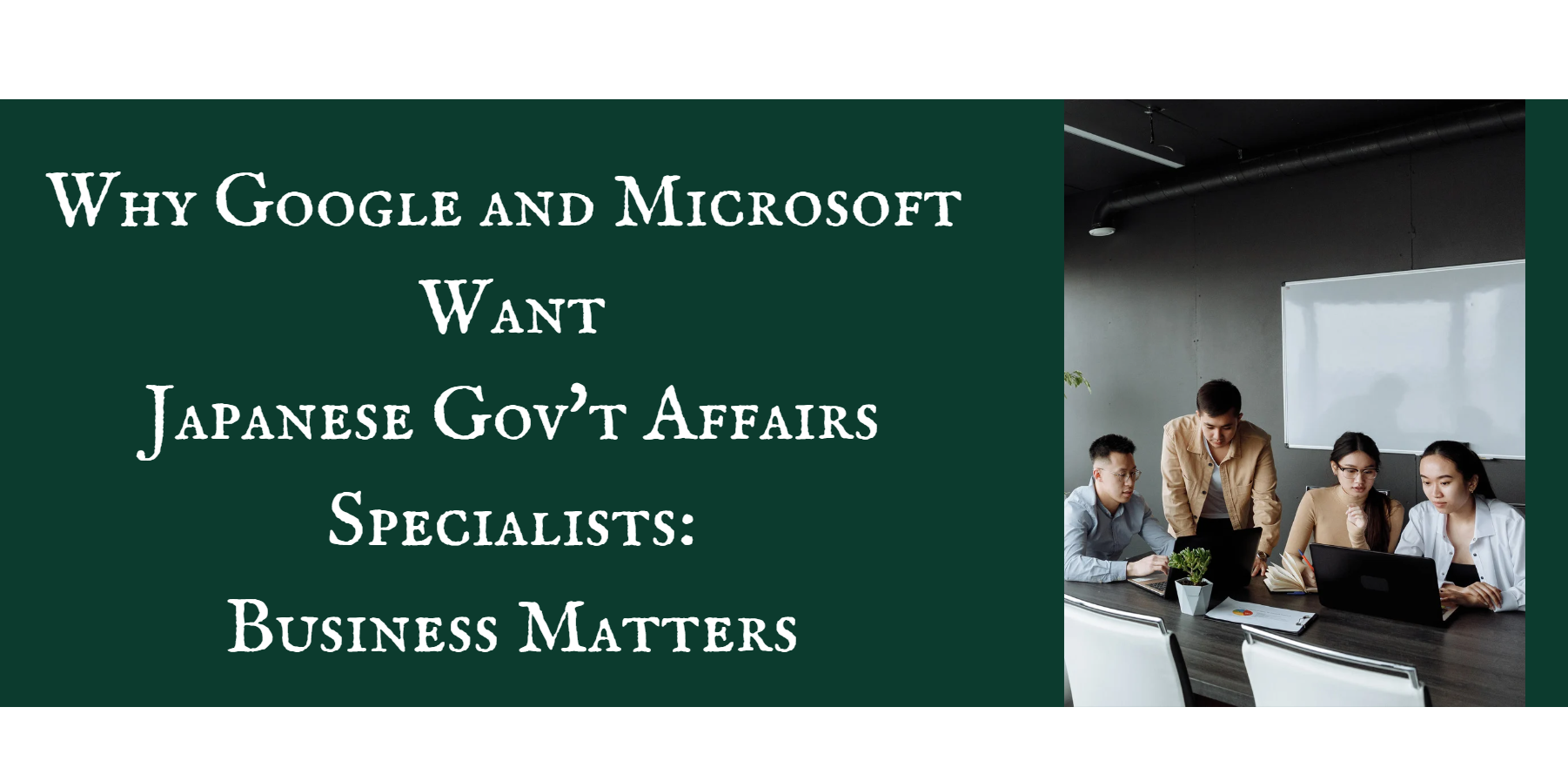
Google and Microsoft try to get Government affairs specialists.
See below background of their movement
Google and Microsoft are two of the largest technology companies in the world, and they both have a significant presence in Japan. Both companies are committed to growing their businesses in Japan, and they are both actively recruiting government affairs professionals to help them navigate the Japanese government bureaucracy and to build relationships with government officials.
Japan has a long history of government-industry-academy collaboration. The government, industry, and academia work together to promote economic development and to address social challenges. This collaboration is essential for Japan to remain competitive in the global economy.
The government-industry-academy collaboration scheme in Japan is a government-led initiative that aims to promote collaboration between the government, industry, and academia. The scheme provides funding and support for projects that involve collaboration between these three sectors.
The government-industry-academy collaboration scheme has been successful in promoting collaboration between the government, industry, and academia. The scheme has helped to create new businesses, to develop new technologies, and to address social challenges.
The recruitment of government affairs professionals by Google and Microsoft is a sign of the companies’ commitment to growing their businesses in Japan. These professionals will help the companies to navigate the Japanese government bureaucracy and to build relationships with government officials. This will give the companies a competitive advantage in the Japanese market and will help them to win government contracts and to influence government policy.
The government-industry-academy collaboration scheme in Japan is an important part of the country’s economic development strategy. The scheme provides funding and support for projects that involve collaboration between the government, industry, and academia. This collaboration is essential for Japan to remain competitive in the global economy.
Reference Google and Microsoft Business strategy in Japan
- Business strategy:
- Google and Microsoft are both focused on three main areas in Japan: search, advertising, and cloud computing.
- Google is the most popular search engine in Japan, and it accounts for a majority of the market share. Google also has a strong presence in the advertising market, and it is the second-largest online advertising platform in Japan. Google’s cloud computing platform, Google Cloud Platform, is also growing rapidly in Japan.
- Microsoft’s productivity software, such as Office 365, is the most popular in Japan. Microsoft also has a strong presence in the cloud computing market, and its Azure platform is the third-largest cloud computing platform in Japan. Microsoft is also a major player in the gaming market in Japan, and it is the second-largest gaming platform in the country.
- Both Google and Microsoft are investing heavily in Japan, and they are both committed to growing their businesses in the country. Both companies are also working to adapt their products and services to meet the needs of Japanese customers.
- Recruitment policy:
- Google and Microsoft’s recruitment process in Japan is divided into three stages:
- Screening: Google and Microsoft review resumes and cover letters to identify candidates who meet the minimum qualifications for the position.
- Interviewing: Google and Microsoft conduct a series of interviews to assess candidates’ skills and experience.
- Hiring: Google and Microsoft make a hiring decision based on the results of the interviews.
- Google and Microsoft offer a variety of benefits to their employees in Japan, including:
- Competitive salaries
- Comprehensive health insurance
- Generous vacation time
- Tuition reimbursement
- Mentorship programs
- Employee resource groups
- Google and Microsoft are committed to creating a workplace that is welcoming and inclusive for all employees, regardless of their background or experience. The companies offer a number of programs and initiatives to support this goal, such as:
- Diversity and inclusion training
- Employee resource groups
- Bias-free hiring practices
- Google and Microsoft’s recruitment process in Japan is divided into three stages:
- AI policy and service:
- Google and Microsoft are both committed to responsible AI development. They have both published AI principles that outline their commitment to fairness, accountability, transparency, privacy, and safety.
- Google and Microsoft are also both investing in AI research and development. They are both working to develop new AI technologies that can be used to solve real-world problems.
- Google and Microsoft are both working to make their AI technologies available to the Japanese public. They are both offering a variety of AI services and tools that can be used by businesses, governments, and individuals.
Here are some specific examples of AI services and tools that Google and Microsoft are offering in Japan:
- Google Cloud Platform: Google Cloud Platform offers a variety of AI services, including machine learning, natural language processing, and computer vision. These services can be used to build a variety of applications, such as chatbots, image recognition software, and fraud detection systems.
- Microsoft Azure: Microsoft Azure also offers a variety of AI services, including machine learning, natural language processing, and computer vision. These services can be used to build a variety of applications, such as chatbots, image recognition software, and fraud detection systems.
- Google AI Platform: Google AI Platform is a research platform that offers access to Google’s latest AI technologies. This platform can be used by researchers and developers to build and train new AI models.
- Microsoft Research: Microsoft Research is a research organization that is focused on developing new AI technologies. This organization has published a number of research papers on AI, and it has also developed a number of AI tools and services.
Overall, Google and Microsoft are both committed to responsible AI development and they are both investing in AI research and development. They are both working to make their AI technologies available to the Japanese public.